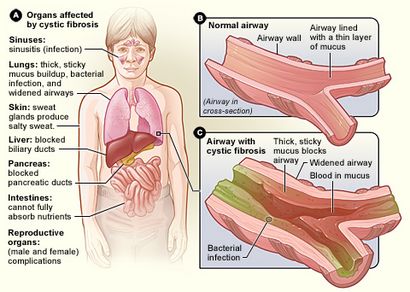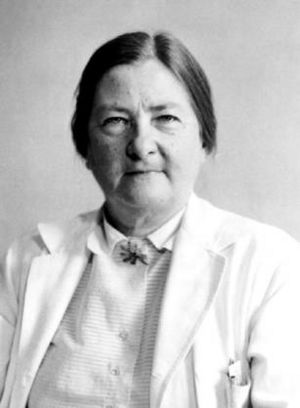Cystic fibrosis facts for kids
Quick facts for kids Cystic fibrosis |
|
|---|---|
| Synonyms | Mucoviscidosis |
 |
|
| Symptoms | Difficulty breathing, coughing up mucus, poor growth, fatty stool |
| Usual onset | Symptoms recognizable ~6 month |
| Duration | Life long |
| Causes | Genetic (autosomal recessive) |
| Risk factors | Genetic |
| Diagnostic method | Sweat test, genetic testing |
| Treatment | Antibiotics, pancreatic enzyme replacement, lung transplantation |
| Prognosis | Life expectancy between 42 and 50 years (developed world) |
| Frequency | 1 out of 3,000 (Northern European) |

Cystic fibrosis (often called CF) is a health condition that people inherit from their parents. It makes the body produce thick, sticky mucus. This mucus can build up in the lungs, digestive system, and other body parts. A child gets CF if they inherit a special gene from both parents. Parents might carry this gene without having CF themselves. CF is not contagious, so you can't catch it from someone. There is no cure for CF yet. However, many medications and treatments help people stay healthy.
Contents
How Cystic Fibrosis Affects the Body
Cystic fibrosis affects many parts of the body. The main problem is that the body has trouble moving salt to where it needs to go. Because salt doesn't move properly, it can build up in places like the lungs, stomach, and intestines.
Impact on Lungs
When salt gets stuck in the lungs, it causes less water to be there. This makes the mucus in the lungs very thick and sticky. This thick mucus makes it very hard to breathe. It can also trap germs, leading to infections.
Treatment for lung issues often includes breathing medicine. This medicine helps add water to the lungs. It makes the mucus thinner, so it's easier to cough up. When mucus is thinner, it's easier to breathe.
Managing Cystic Fibrosis
There is no cure for cystic fibrosis, but people can do many things to stay healthy. These healthy habits help prevent them from getting sicker.
Daily Habits for Health
- Stay Clean: It's important to stay clean and avoid germs. This helps prevent infections.
- Drink Water: Drinking plenty of water helps keep mucus thinner. This makes it easier for the body to clear it.
- Take Enzymes: If mucus builds up in the stomach, it can make it hard to digest food. Taking enzymes helps the body break down and absorb nutrients from food.
- Exercise: Regular exercise is very helpful. It clears mucus from the lungs. It also builds strong muscles and bones and strengthens the lungs.
- Take Vitamins: Taking vitamins helps the body fight off infections. They also help the body grow and work well.
Common Treatments
- Inhaled Antibiotics: These medicines are breathed in. They help stop bacteria from growing in the thick mucus in the lungs.
- Inhaled Salt-Water: Breathing in salt-water (also called hypertonic saline) helps keep the lungs moist. This makes the mucus less sticky and easier to clear.
Testing for Cystic Fibrosis
Doctors use a few tests to find out if someone has cystic fibrosis.
- Sweat Chloride Test: This test measures the amount of salt in a person's sweat. People with CF often have more salt in their sweat than others.
- Genetic Test: If the sweat test suggests CF, a genetic test is often done. This test checks for the specific genes that cause cystic fibrosis. It confirms if a person has both genes needed for the condition.
What is "65 Roses"?
"65 roses" is a special phrase that some young children use to talk about their condition. The words "cystic fibrosis" can be hard for little kids to say. When spoken aloud, "65 roses" sounds very similar to "cystic fibrosis."
The Cystic Fibrosis Foundation has even made "65 Roses" a trademark. This helps control how the phrase is used. It's a very helpful and kind way for young children to understand and talk about their health condition.
See also
 In Spanish: Fibrosis quística para niños
In Spanish: Fibrosis quística para niños

